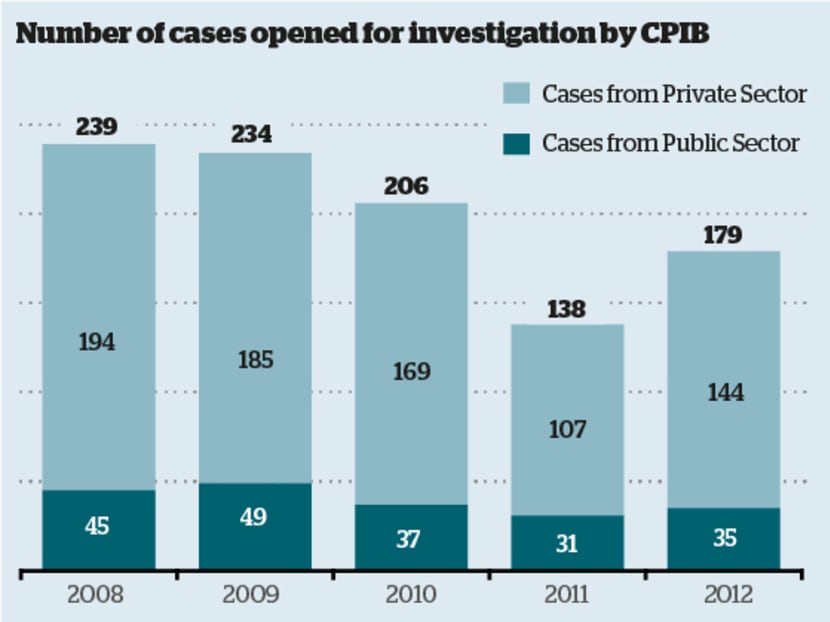Half of errant civil servants from enforcement units: Study
SINGAPORE — Over the last five years, about half of the errant public officers who were investigated and found culpable by the anti-graft watchdog and white-collar crime busters were front-line employees in enforcement units.
SINGAPORE — Over the last five years, about half of the errant public officers who were investigated and found culpable by the anti-graft watchdog and white-collar crime busters were front-line employees in enforcement units.
These civil servants were from various agencies — the Home Team, Housing and Development Board, National Environment Agency, Ministry of Manpower and the Urban Redevelopment Authority — and included rank-and-file officers, such as parking wardens and those who enforced employment or exit permits.
Where gratification or reward was involved, 65 per cent of the officers investigated received solely money.
The rest were rewarded with gifts (12 per cent), sexual favours (6 per cent), a combination of money and sexual favours (5 per cent) and other forms of gratification.
Sums of less than S$1,000 changed hands in 40 per cent of the cases where the public officers received money as gratification or reward. Those involving sums of more than S$30,000 made up 18 per cent of the cases.
These were among the study — the first of its kind — commissioned by the Prime Minister’s Office (PMO) and led by then Deputy Secretary (Home Affairs) Tai Wei Shyong.
Conducted earlier this year, the study was triggered by the recent spate of high-profile cases involving errant public officers. It was mentioned on Wednesday by Deputy Prime Minister Teo Chee Hean in a PMO statement on Corrupt Practices Investigation Bureau (CPIB) senior officer Edwin Yeo Seow Hiong being charged with misappropriation of public funds.
Analysing cases investigated by the CPIB and Commercial Affairs Department (CAD) between 2008 and last year, it found that the number of cases involving the public sector was “low and fairly stable” at an average of 39 each year, or about one in five of all cases opened for investigation.
About two-thirds of cases involving public officers led to prosecution or internal disciplinary proceedings.
Last year, the CPIB opened 35 cases from the public sector and 144 from the private sector.
The study also found that the vast majority of errant public officers were male (92 per cent). Those with university degrees and above comprised 23 per cent, while those with A-Levels and diploma holders made up 29 per cent. The remaining had educational qualifications of O-Levels and below.
Of the public officers investigated under the Prevention of Corruption Act, letting an offender off or showing “unwarranted leniency” were the most common act (53 per cent), followed by unauthorised provision of service or information (21 per cent), and providing favourable treatment in employment or opportunities (15 per cent).
The findings of the study was made public yesterday, under Mr Teo’s direction. It was also disseminated to all public officers, along with a letter by Head of Civil Service Peter Ong.
Mr Ong wrote in the letter that he was “deeply disappointed” to learn of Yeo’s case. Acknowledging that the recent headline-grabbing cases have “resulted in questions about the integrity of the Public Service”, he said that he was “reassured” by the findings of the study “as they show that our system as a whole remains sound”.
“But we cannot be complacent. Every case is one too many,” said Mr Ong, adding that the authorities “will not hesitate to take action against a corrupt officer, no matter how senior he or she might be”.










